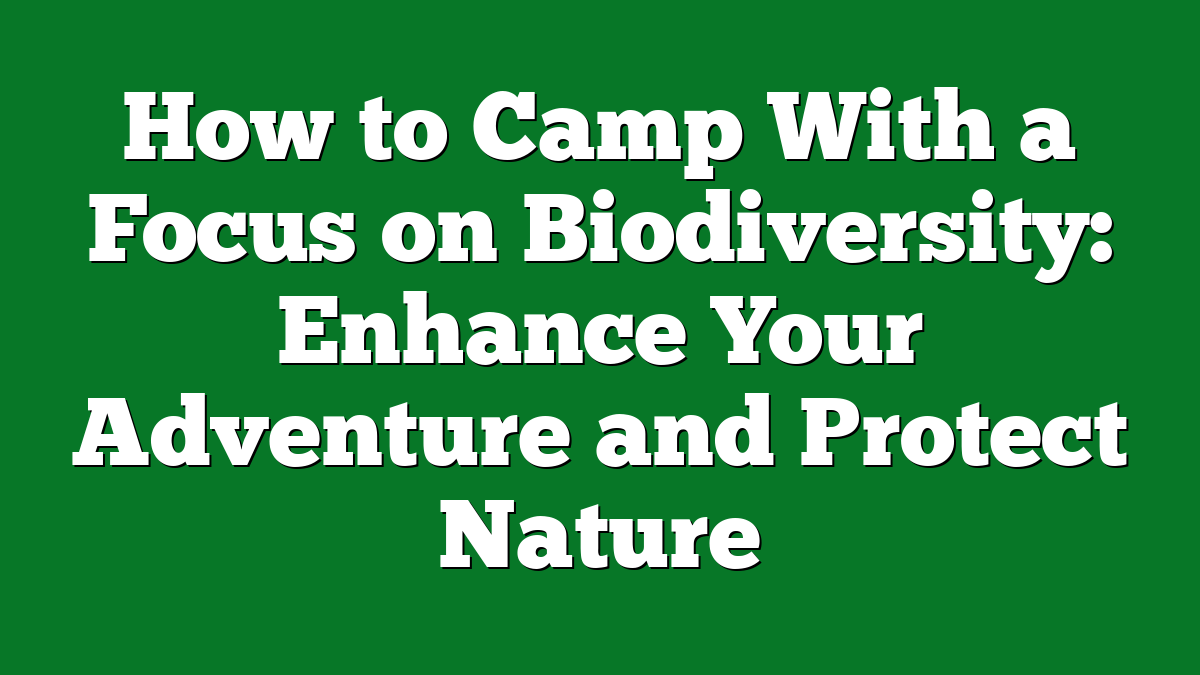Camping is one of my favorite ways to connect with nature, but it’s more than just a getaway. It’s an opportunity to immerse ourselves in the beauty of our planet’s diverse ecosystems. When I camp with a focus on biodiversity, I not only enjoy the great outdoors but also play a part in preserving it for future generations.
Understanding Biodiversity in Camping
Understanding biodiversity holds significant importance for camping enthusiasts. Biodiversity refers to the variety of life forms in a particular habitat, including plants, animals, fungi, and microorganisms. By appreciating biodiversity, I recognize that every species plays a unique role in maintaining ecosystem balance.
Camping offers an opportunity to observe diverse ecosystems firsthand. Each campsite hosts different flora and fauna. It’s essential to explore these environments respectfully, ensuring their preservation. For example, spotting a rare bird or identifying plant species can deepen my connection to nature while highlighting the need for conservation.
- Ecosystem importance: Each organism contributes to nutrient cycling, pollination, and food webs, supporting overall ecosystem health.
- Habitat variety: Wetlands, forests, deserts, and mountains provide refuge for countless species, each requiring specific conditions for survival.
- Human impact: Camping practices, like choosing established trails and minimizing campfire use, help reduce human impact on delicate ecosystems. Following Leave No Trace principles is crucial.
Understanding local wildlife enhances my camping experiences. For instance, knowing which plants are edible or identifying animal tracks enriches my time outdoors. Engaging in citizen science, such as bird watching or documenting plant life, increases my awareness and fosters a personal investment in local biodiversity.
By camping with a focus on biodiversity, I contribute to conservation. Observing and appreciating the natural world fosters a sense of responsibility to protect it for future generations. Each trip becomes not just an adventure but a step toward ensuring the health of our planet’s ecosystems.
Benefits of Camping with a Biodiversity Focus
Camping with a biodiversity focus offers numerous benefits that enhance my outdoor experiences while protecting our planet. Engaging with diverse ecosystems enriches my understanding of nature and its intricate web of life.
Enhancing Ecosystem Health
Camping in biodiverse areas promotes the overall health of ecosystems. I notice that healthy ecosystems support a wide range of plant and animal species. Observing varied life forms, like migratory birds, insects, and aquatic creatures, reveals how each contributes to the stability of their environment. By camping in these areas, I support habitat preservation while encouraging the natural balance essential for ecological sustainability. Choosing sites with rich biodiversity allows me to witness firsthand the effects of nutritious soil, clean water, and diverse plant life on local wildlife.
Promoting Conservation Awareness
Camping with a focus on biodiversity raises awareness about conservation efforts. I find that interacting with various species fosters a deeper connection to nature. This connection motivates me to advocate for preserving our natural habitats. As I explore these areas, I often engage in conversations about conservation with fellow campers, sharing knowledge about local wildlife and the threats they face. Participating in citizen science projects, such as bird counts or plant surveys, further enhances my understanding of the ecosystem. Each camping trip becomes an opportunity to educate others and spread the word about the importance of protecting these valuable resources for future generations.
Planning Your Camping Trip
Camping with a focus on biodiversity starts with thoughtful planning. I’m passionate about immersing myself in nature, and ensuring my trip promotes ecological health is essential. Here are some key aspects to consider.
Choosing Biodiverse Locations
Selecting biodiverse locations enhances my camping experience. I seek out areas with rich ecosystems, such as national parks, wildlife refuges, or designated nature reserves. These sites exhibit a variety of habitats, supporting diverse plant and animal species. I consult resources like local conservation websites, park services, or nature guides to identify regions teeming with life. Examples include the Great Smoky Mountains or the Everglades, where I can witness the interconnectedness of ecosystems. Researching local biodiversity also informs me about unique species I’ve yet to encounter, making each trip an educational adventure.
Seasonal Considerations
Timing my camping trips according to the seasons has significant impacts on biodiversity. I aim to camp during peak seasons for wildlife activity, which usually coincide with breeding or migration periods. Spring invites blooming flowers, which attract pollinators and birds, while fall showcases vibrant foliage and animal migrations. Weather conditions also affect species’ behaviors and habitats. I prepare for variable conditions by packing appropriate gear and supplies. Knowing the seasonal dynamics ensures I engage with ecosystems at their most vibrant, deepening my appreciation of nature’s cycles. Seasonally adapting my site selection and activities makes for a richer, more impactful camping experience.
Sustainable Camping Practices
Sustainable camping practices enhance outdoor experiences while protecting our natural world. As an avid camper, I embrace these practices to connect deeply with the environment and support biodiversity.
Leave No Trace Principles
I prioritize the Leave No Trace principles to minimize my impact on nature. These seven guidelines help ensure campers like me respect the land:
- Plan Ahead and Prepare: I research camping sites and practice proper food storage to avoid attracting wildlife.
- Travel and Camp on Durable Surfaces: I stick to established trails and camping areas, preventing damage to fragile ecosystems.
- Dispose of Waste Properly: I pack out all trash and waste, including food scraps, to keep campsites clean and reduce pollution.
- Leave What You Find: I admire natural features without taking anything, including plants or rocks, preserving the environment for others.
- Minimize Campfire Impact: I use a camp stove instead of building fires when possible, reducing the risk of wildfires and protecting soil and vegetation.
- Respect Wildlife: I observe animals from a distance and never feed them, allowing them to maintain natural behaviors.
- Be Considerate of Other Visitors: I keep noise levels down and respect other campers, ensuring everyone enjoys their experience in nature.
By following these principles, I contribute to the protection of species and habitats, fostering a more sustainable outdoor experience.
Native Species Planting
I support biodiversity by getting involved in native species planting during my camping trips. Here’s how I do it:
- Research Native Plants: I identify native plants for specific areas, understanding which flora supports local wildlife and ecosystems.
- Choose Planting Sites Wisely: I select areas that need restoration, avoiding disturbance to sensitive environments.
- Engage with Local Organizations: I participate in local conservation groups that organize planting events, connecting with fellow nature enthusiasts while making a difference.
- Use Native Seeds and Plants: I source native seeds from local nurseries or seed swaps, ensuring the plants thrive and contribute positively to their ecosystems.
- Educate Others: I share knowledge about the benefits of planting natives with fellow campers, raising awareness of their importance to biodiversity.
Through these actions, I help foster healthy ecosystems while enriching my own camping experiences, creating a lasting impact for future generations.
Engaging with Nature
Engaging with nature offers unforgettable camping experiences that deepen my appreciation for biodiversity. Here are some effective ways to immerse myself in the environment and promote ecological awareness.
Wildlife Observation Tips
- Choose the Right Time: Observing wildlife is best during dawn and dusk when many species are most active. Early risers catch the critters at breakfast.
- Move Quietly: Silence enhances wildlife encounters. Slow, deliberate movements minimize disturbances, allowing me to observe animals in their natural behaviors without startling them.
- Use Binoculars: A good pair of binoculars brings distant wildlife into view. Spotting birds, deer, or other creatures becomes easier, making my experience richer.
- Learn Animal Calls: Familiarizing myself with local animal calls helps identify species. Each sound adds to the tapestry of the natural environment.
- Practice Patience: Wildlife observation requires patience. Waiting quietly often rewards me with spectacular sightings.
Eco-friendly Activities
- Start a Nature Journal: Documenting observations in a nature journal fosters mindfulness. Writing about flora and fauna encountered reinforces my connection to the landscape.
- Participate in Citizen Science: Getting involved in local conservation projects amplifies education and biodiversity awareness. Contributing data to wildlife monitoring programs makes an impactful difference.
- Create Insect Hotels: Constructing insect hotels supports local ecosystems. Providing shelter for pollinators and beneficial insects enhances the diversity of life around my campsite.
- Engage in Native Plant Identification: Learning about local plants promotes understanding of their roles in the ecosystem. Identifying and appreciating native species enriches my camping experience.
- Lead Guided Hikes: Sharing my love of the outdoors with others magnifies appreciation for nature. Hosting guided hikes fosters eco-awareness while promoting local biodiversity.
Engaging with nature transforms every camping trip into an opportunity for adventure and education. By observing wildlife and participating in eco-friendly activities, I help preserve the beauty of the natural world while enjoying the great outdoors.
Conclusion
Camping with a focus on biodiversity has truly changed the way I experience the outdoors. Each trip becomes a chance to learn and grow while deepening my connection to nature. By choosing biodiverse locations and practicing sustainable camping methods, I not only enjoy the beauty around me but also play a part in preserving it.
I love that every moment spent in these vibrant ecosystems reminds me of our responsibility to protect them. Whether it’s observing wildlife or engaging in conservation efforts, I feel empowered to make a difference. So next time you head out into the wild, remember that your adventures can contribute to a healthier planet and inspire others to do the same. Let’s make every camping trip count for biodiversity!











